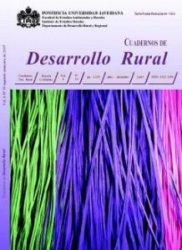Abstract
El modelo de desarrollo implementado en Chile en las últimas décadas ha profundizado losprocesos de globalización y apertura comercial del país, generando cambios importantes en lasestrategias productivas, trabajo y vida cotidiana de los habitantes rurales. Estas transformacionesse experimentan de manera distinta en diferentes territorios y estratos de productores, dado queellos internalizan las tendencias globales según sus recursos productivos, capacidad de gestión,experiencias de aprendizaje y percepción de oportunidades comerciales.En este trabajo se analizan las estrategias productivas de los pequeños productores agropecuariosde la provincia de Ñuble, Chile, frente a los cambios contextuales. Ellas pueden asumir un caráctermás tradicional o de mayor innovación según cómo los códigos modernizadores son interpretadospor los productores y de sus posibilidades de incorporarlos en sus sistemas productivos, dereinterpretarlos o transformarlos en estrategias productivas acordes con sus recursos, capacidadde gestión e identidad cultural. Se han utilizado datos censales y estadísticas sectoriales,complementadas con una encuesta a una muestra de pequeños productores de la provincia bajoestudioCuadernos de Desarrollo Ruralis registered under a Creative Commons Attribution 4.0 International Public License. Thus, this work may be reproduced, distributed, and publicly shared in digital format, as long as the names of the authors and Pontificia Universidad Javeriana are acknowledged. Others are allowed to quote, adapt, transform, auto-archive, republish, and create based on this material, for any purpose (even commercial ones), provided the authorship is duly acknowledged, a link to the original work is provided, and it is specified if changes have been made. Pontificia Universidad Javeriana does not hold the rights of published works and the authors are solely responsible for the contents of their works; they keep the moral, intellectual, privacy, and publicity rights.
Approving the intervention of the work (review, copy-editing, translation, layout) and the following outreach, are granted through an use license and not through an assignment of rights. This means the journal and Pontificia Universidad Javeriana cannot be held responsible for any ethical malpractice by the authors. As a consequence of the protection granted by the use license, the journal is not required to publish recantations or modify information already published, unless the errata stems from the editorial management process. Publishing contents in this journal does not generate royalties for contributors.


